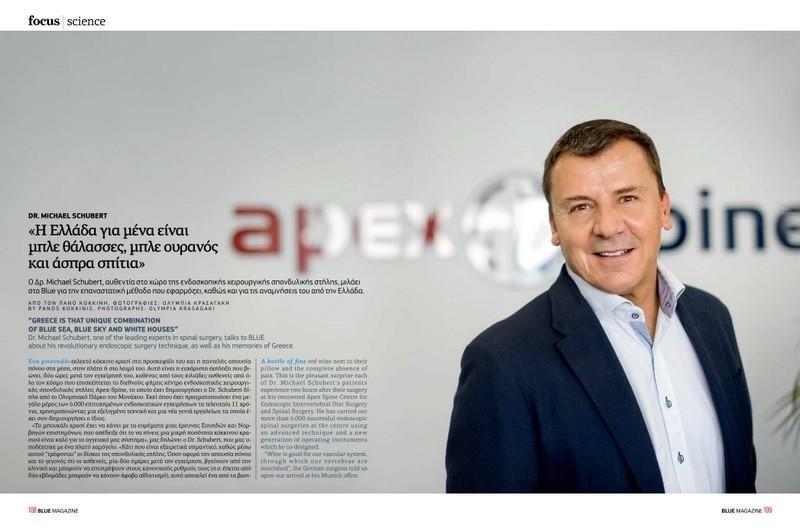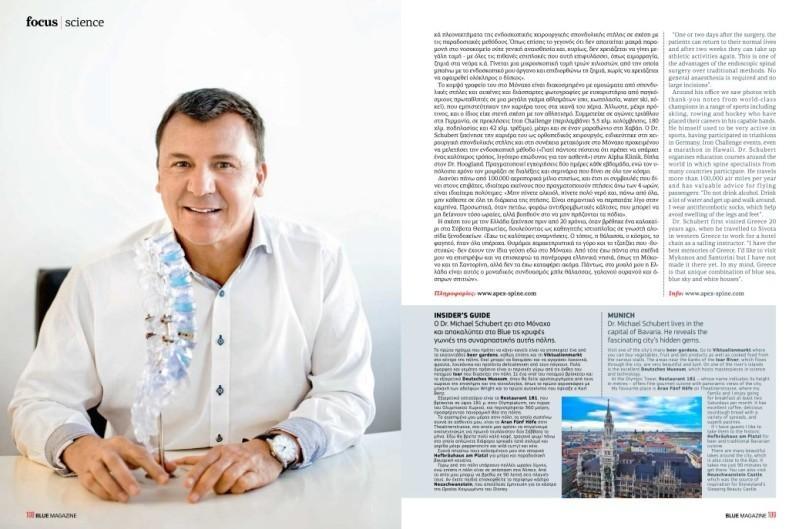A bottle of fine red wine next to their pillow and the complete absence of pain from their cervical (neck), thoracic (rib cage) or lumbar (lower back) regions of his spine. This is the pleasant surprise each of Dr. Michael Schubert's thousands of patients experience two hours after their surgery at his renowned Apex Spine Center for Endoscopic Intervertebral Disc Surgery and Spinal Surgery – which Dr Schubert created next to Munich's Olympic Park. During the last 11 years he has carried out more than 6,000 successful endoscopic spinal surgeries at the center using an advanced technique and a new generation of operating instruments which he co-designed.
"The bottle of wine is a reference to the findings of a research carried out by Swede and Norwegian scientists who proved that drinking a small quantity of red wine is good for our vascular system", Dr. Schubert told us after welcoming us with a grin.
« This is very important given that it is through the vascular system that the discs of our spine are nourished. “As for the absence of pain and the fact that the patients can leave the clinic one-two days after the surgery and return to their normal lives (after two weeks they can take up athletic activities again fearlessly) is one of the basic advantages of the endoscopic spinal surgery over traditional methods. A nd so is the fact that no prolonged hospital stay is required, no general anesthesia and, mainly, no need for a large incision – with all the possible complications it has like bleeding, nerve damage etc. A tiny incision of 3 mms is made , through which I enter my endoscopic instrument and repair the damage, without having to remove the whole disc.”
His elegant office in Munich is decorated with anatomical models of spines and their cervical sections and dotted throughout are photos with thank-you notes from world-class champions in a range of sports including skiing, rowing and hockey who have placed their careers in his capable hands. Moreover, until recently, he himself had been very active in sports. He participated in triathlons in Germany, Iron Challenge events (consisting of 3.5 klms swimming races, 180 klms cycling, and 42 klms running) , even a marathon in Hawaii.
dr Schubert began his career as an orthopedic surgeon, he specialized in spinal surgery and then moved to Munich in order to study the endoscopic method next to Dr Hoogland at the Alpha Klinik ("Because I've always believed that there must be a better way, less painful for the patient”)
He operates on two days per week, while the rest of his time he lectures and organizes education courses around the world in which spine specialists from many countries participate.
He travels more than 100,000 air miles per year and has valuable advice for flying passengers, especially those whose flights are over 4 hours long, is very valuable: “Do not drink alcohol. Drink a lot of water and, most importantly do not remain sitting during the whole flight. It is important to get up and walk around the cabin. Personally when I fly, I wear antithrombotic socks, which help avoid swelling of the legs and feet”.
His relationship with Greece began 20 years ago when he went to Sivota, in western Greece, one summer to work for a hotel chain as a sailing instructor. « I have the best memories. The country, the sea, the people, the food - everything was wonderful. I remember very well the 'gyros' and the 'tzatziki' which -unfortunately- they do not taste the same in Munich. Since then I always include in my plan to visit the beautiful Greek islands , like mykonos other Santorini , but I haven't made it yet. In my mind Greece is that unique combination of blue sea, light blue sky and white houses”.
Info : www.apex-spine.com


